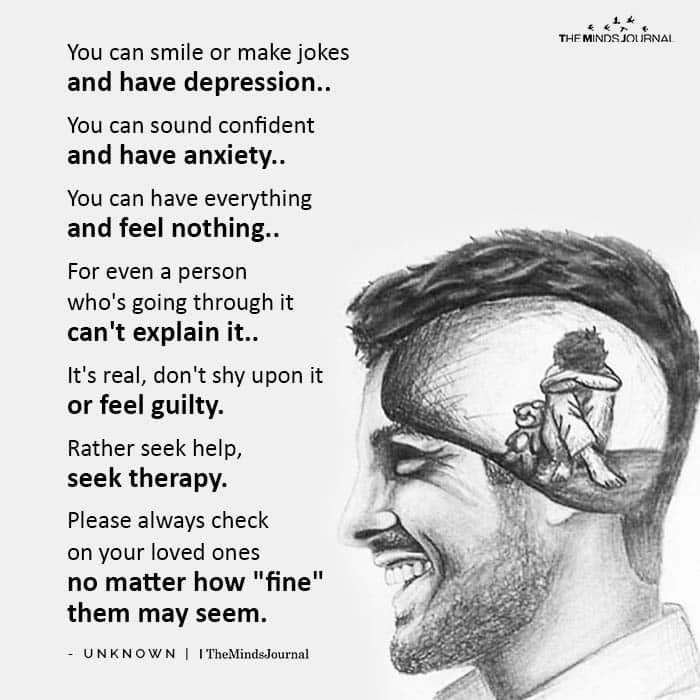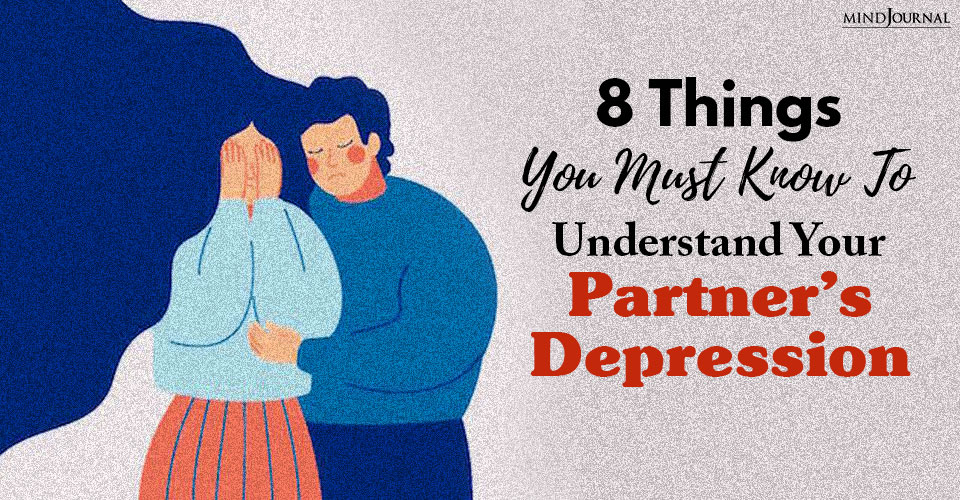How to undersand your partner’s depression?
Going through depression is hard enough on it’s own without the crushing guilt that comes along with potentially trashing your relationship.
Combined with the fact that serious depression is difficult to comprehend without having actually experienced it yourself— it can lead to a perfect storm of relationship damaging behavior both from the person who is going through it and their partner who in an attempt to help, just can’t seem to do or say the right thing.
So what do you do if your partner seems like they might be spiraling?
1. Recognize the signs of depression in the first place and consider if you or your loved one might be experiencing them.
The classic signs of depression are:
- Persistent sad, anxious, or “empty” mood
- Feelings of hopelessness, pessimism
- Feelings of guilt, worthlessness, helplessness
- Loss of interest or pleasure in hobbies and activities
- Decreased energy, fatigue, being “slowed down”
- Difficulty concentrating, remembering, making decisions
- Difficulty sleeping, early-morning awakening, or oversleeping
- Appetite and/or weight changes
- Thoughts of death or suicide; suicide attempts
- Restlessness, irritability
- Persistent physical symptoms
Source: National Institute of Mental Health

They might not come right out and say anything is wrong since most people don’t want to admit that it’s happening– even to themselves.
Read 7 Warning Signs Of Depression That You Need To Know
2. Be non-accusatory and consider your own attitude first.
Understand that depression is not a choice, a moral failing or a personal affront to you.
Let that sink in for a second.
Repeat after me: depression is not a choice.
It isn’t a ploy for attention or something that they’re “doing.” It’s an under-addressed, serious illness that affects every area of someone’s life. Our culture tends to treat it like a moral failing— like if sufferers would just “buck up” it would solve everything. This is wrong thinking and contributes to the epidemic of quiet desperation in our society.
Because of this, there is a huge personal pride aspect to contend with. Usually it’s extremely difficult for sufferers to even admit that there is a problem— so don’t try to force anything.
It’s not just “the blues,” it can come without warning, and it’s brutal. Trust. If you happen to think it’s “no big deal,” be prepared to STFU or get schooled on exactly how much more miserable you can make your lover. Take it seriously and avoid being flippant at all costs.
3. Don’t try to cheer them up or reason them out of it.
If logical thinking was an anti-depressant, no one would be depressed.
Don’t offer reasons why they shouldn’t be depressed. Your brilliant solutions will only serve to depress them further and disconnect them from your relationship.
If you don’t get what they are going through or why, it’s better to just offer your caring and support rather than trying to “fix it.”
If they had the presence of mind to explain it to you – your partner WISHES it was as simple as implementing whatever solution you can come up with. They don’t want to brainstorm “ideas to fix it” either.
For your relationship with them to have a chance at all, you have to leave therapy to actual therapists.
The more you bumble around and try to save them or fix what they’re going through, the more they are likely to become angry with you, withdraw further and feel even more lonely and misunderstood. You will push them away if you do this, which is dangerous for them and your relationship.
Read How To Help Your Partner (And Yourself) Overcome Depression
4. Help, help and help some more.
Subtly suggest seeing someone with the intention to get them professional help if they aren’t getting it already.
By subtly, I mean saying something like, “I’ve noticed that you’ve seemed down a lot lately. Maybe we should go see someone. I found this really good recommendation.”
Using “we” makes it seem non-accusatory and gets your foot in the door— on the way to getting their buy-in. This little turn of phase from “you” to “we” lets them save face, and right now they need that. By saying “we,” do NOT imply you are going to go to couple’s therapy or even remotely suggest that.
The idea is to help them save face. Going to counseling together with them will backfire since if they are in fact clinically depressed, your relationship with them has to take a back seat right now to helping them get their health back. A couple’s therapy for your partner’s depression will most likely go badly. Don’t do it right now.
Next, do the work to get them there if they are at least half-way receptive. Don’t be like, “You need therapy!” ever. Remember that the goal is to get them help that will make it easier for them to climb out of the pit.
You can’t do the hard part for them, but you can do some legwork that will actually make a difference.
There are times in relationships where it’s time to knuckle down and be the strong one. A seriously depressed partner is one of those times. Accept that for the time being, you might be taking on more of the hard work and help them out. Even if they can’t show you their appreciation right now, most likely your effort is not going unnoticed. They are watching out of the corner of their eye.
Read 6 Things To Remember If Your Partner Is Suffering from Depression
5. Don’t patronize them.
They are depressed, they didn’t lose half their IQ.
Don’t ask them questions like “are you sure you want to do X,Y or Z?” Just go with the flow, help and accept that there will be good days and bad. They aren’t “moping,” so don’t make jokes about it, even when your intentions are good.
The depressed mind lies. Your partner’s depression causes them to rake themselves over the coals all on their own. Any added insults from you in the form of pitying behavior or jokes will make them feel increasingly worse.
Read 5 tips for dating with depression
6. Do not share the private details of your partner’s depression with your friends or family.
The experience of clinical depression is extremely private and your partner’s business. Since there is such a huge stigma surrounding depression, the last thing they want right now is to have to explain to people, that “no, they aren’t crazy”.
Even though you might understand that your relationship might be going through your partner’s depression, you owe it to your partner to let them share about their illness when and if they want to.
Try to carefully get professional help for your partner’s depression, but don’t mistake getting them professional help with telling everyone they know in hopes that someone has a magic wand. They don’t.
Depressed people often mask what’s really going on with them to everyone, so even if you suspect that something is wrong, ripping that mask off will only cause the depressed more shame around a condition they would love to control, but can’t.
If you need support because going through this is taking a toll on you as well, talk to a professional or someone far removed from the situation who can be expected to maintain your full confidence. There is a good forum at Depression Fallout where people dealing with partner’s depression support each other that I highly recommend also.
7. Enjoy the good times.
When things is good or their mood lifts, enjoy the heck out of it.
It’s so easy to let yourself slide down with them and it’s vitally important that you resist the urge. That’s why you should get while the getting is good. Don’t ask questions or ask why they aren’t like this all the time. Remember, it’s not a choice but there can still be good times. Appreciate them when they show up.
This leads to my next point…
Read 4 Steps That Help You Bid Goodbye To Depression
8. Take care of your own emotional health.
Moods in relationships are contagious. It’s really easy to let yourself slide into the pit with them. It’s easy to get resentful if you feel like you’re doing everything.
Your partner’s depression can make you feel like you’re having a one-sided relationship.
In a sense you are, since depression tends to creep in and take everything over. The best thing you can do is to maintain your autonomy when it comes to doing activities that you enjoy and that keep you sane.











Leave a Reply